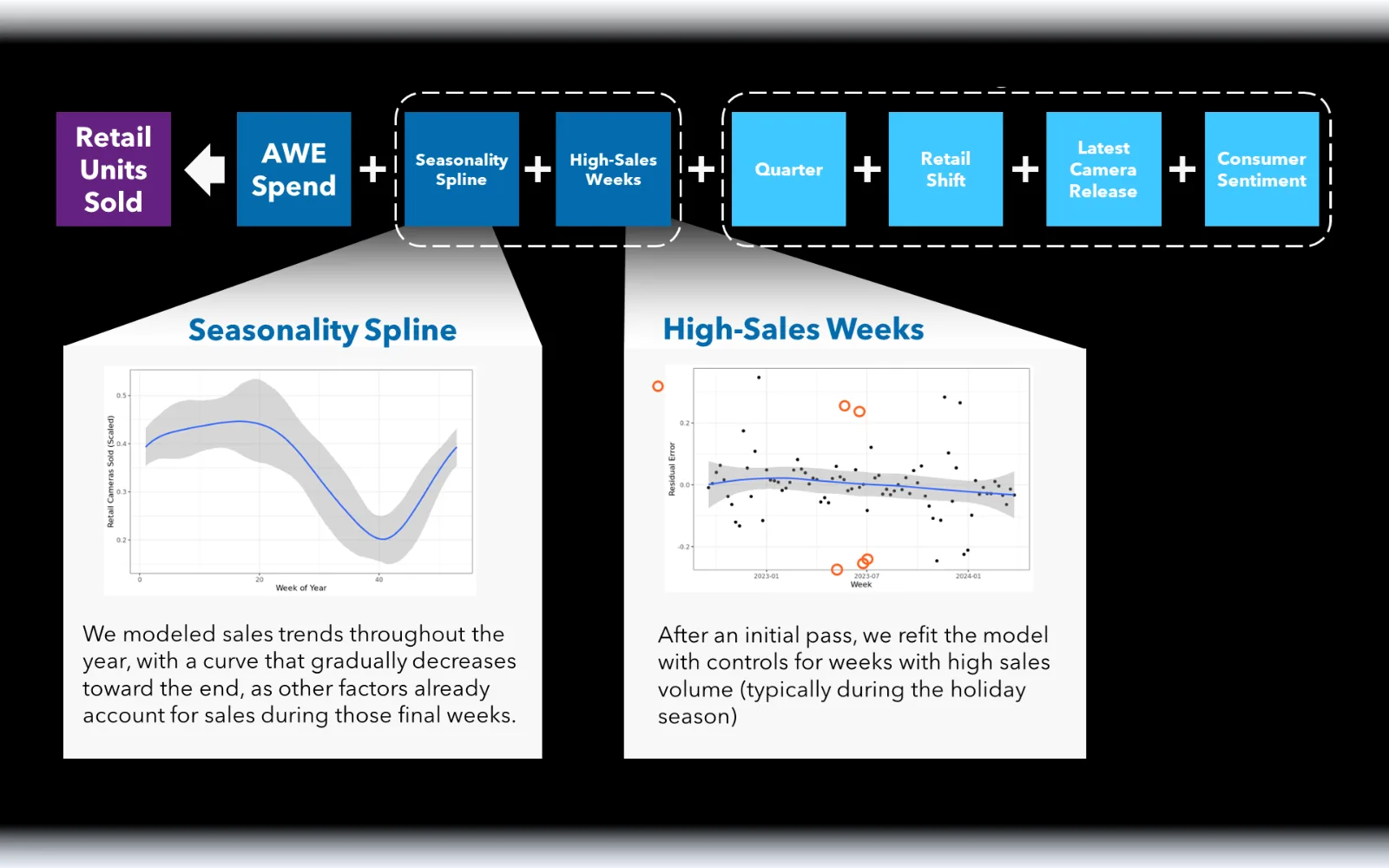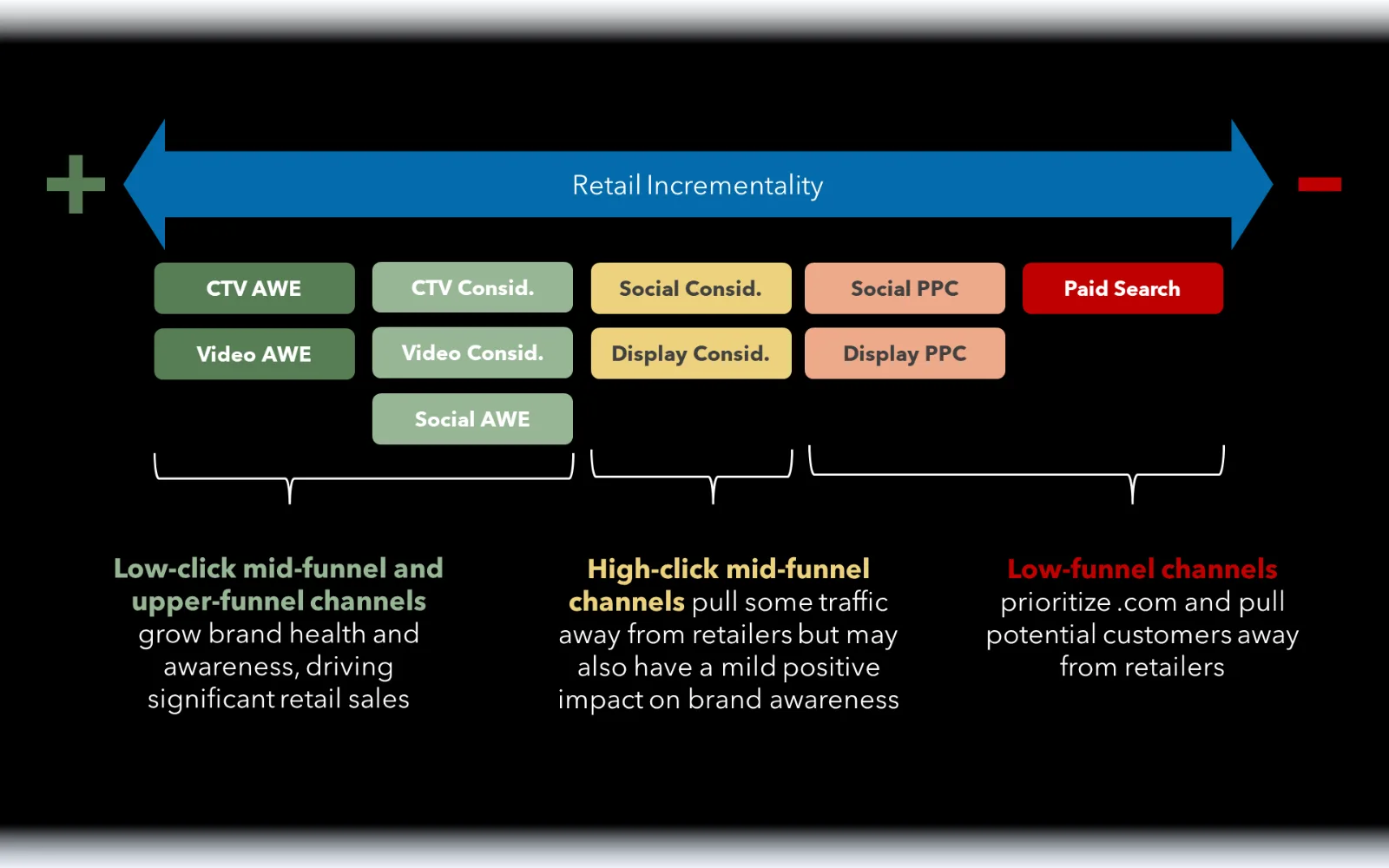Marketing effectiveness case study
Measuring marketing's impact across multiple sales channels
The challenge
How many sales does marketing drive across all sales channels?
As COVID hit, a personal tech had client shifted tactics, opting focus on D2C sales, luring prospects with discounts. However, though sales were buoyed by the pandemic, the direct channel never surpassed the pre-pandemic size and scale of retail.
As Marketbridge began our engagement, the strategy shifted again. Now, the focus returned to retail, and the direct discount was removed. The marketing budget, previously focused on driving direct sales, was now under major scrutiny.
Our client needed to quantify marketing’s impact and optimize budget to drive sales across both sales channels.
The objective
Optimize marketing budget for online and offline sales channels
Our client needed to measure impact and fine-tune the budget to drive sales in both channels: retail and D2C. We identified three key objectives to bring this clarity.
1: Understand drivers of retail sales
Build a retail media mix model (MMM) to gain insight into how marketing channels drive retail sales.
- Marketing channel contributions to retail sales
- Response curves and ROAS to optimize spend
- Retail customer acquisition cost (CAC)
2: Update D2C MMM for new reality
Refine an existing direct-to-consumer MMM to understand marketing performance after the strategic shift.
- New contributions and response curves
- Funnel and ROAS optimization opportunities
- Insights and recommendations based on new reality
3: Find optimization opportunities
Reconcile findings from both MMMs to provide holistic optimization recommendations.
- Combined response curves
- All-in CAC calculation
- Optimizations to maximize revenue for client

The solution
Multi-model approach to measure marketing impact
Leveraging our deep understanding of the D2C business, we launched discovery with retail stakeholders and quickly learned the drivers and mechanisms of retail channel performance.
Modeling across sales channels provided new insights into how to optimize marketing spend to maximize sales while considering gross margin differences.
Part 1: Build the retail model
We developed a media mix model (MMM) for retail leveraging weekly sell-through data. To ensure a thorough understanding of marketing’s impact, we developed robust competitor and price controls.
(A) Find channel incrementality
Generated insight into which media have positive impact on retail sales and which have a zero or negative impact
(B) Consider gross margin
Used gross margin to calculate the CAC to account for distribution cost through retail
(C) Identify potential tests
Provided insights and testing opportunities to optimize marketing budget to drive retail sales

Part 2: Develop holistic view of marketing’s impact on sales
After refining the direct-to-consumer MMM, we combined results across models to provide insights, recommendations and tradeoffs for investment optimizations.
(A) Estimate overall ROAS
Found opportunity for increased investment as blended CAC and ROAS were significantly below established thresholds
(B) Flag negative channels
Paid search negatively impact on retail sales, raising questions of channel level trade-offs and cannibalization
(C) Optimize for sales volume
Provided recommendations on investment optimizations to maximize sales across distribution channels
Business impact
Holistic understanding of sales impact resulted sales optimizations
After years of optimizing marketing budget based on known direct-to-consumer impact and hypothesized potential impact on retail, the client organization was pleased with a more holistic understanding of marketing’s impact.
Shifted goals for marketing team
The new blended MMM demonstrated that marketing investment would drive more sales if shifted up funnel. This resulted in a reduced direct channel sales goal and a significant boost to retail targets.
Optimized budget to drive additional 9% in sales
Client shifted budget from paid search, to brand-building, resulting in an additional 9% in overall sales on flat budget by avoiding cross-channel cannibalization.
Communicated value to retail partners
Quantifying marketing investment impact on retail sales energized retail partners while coordinating promotions and in-store advertising.